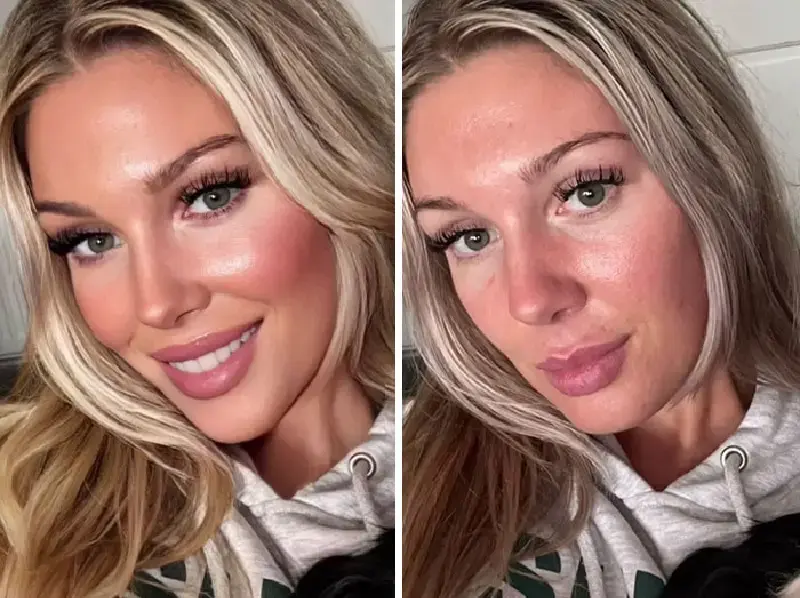



Social media filters have quickly altered how people look at beauty, greatly affecting the guidelines of beauty in social media, as well as in real life. These appearance modifying filters, created to make them look better or different, are sculpting people's outlook towards themselves and others going both ways to influence the way one thinks about oneself.
More than anything else, Instagram, TikTok, and Snapchat have changed the way we interact with beauty. filters to 'smooth' skin, 'enlarge' eyes and add 'makeup' effects have become popular ways for people to display an idealised version of themselves. These would make someone seem more attractive, as society generally perceives beauty as having clear skin, sharp jawline and fuller lips.
While filters can enhance one’s self esteem they yield unattainable beauty goals. However, this artificial increase of beauty contributes to an increasing separation between how people really look and how they are portrayed on the Internet and in their self image and self worth.
Continuous use of face filters can have a negative impact on mental health leading bodies to be dissatisfied and causing body dysmorphia and more. With people more and more comparing themselves to these unrealistic digital representations, they start to feel lacking. They feel inadequate as filters are used by social media influencers to create a flawless impression about themselves, forcing everyone else to resort to filters, too.
Recently studies have shown the effect social media has on young people, especially on teenagers and young adults, creating unrealistic beauty standards. By constantly showcasing idealised images, users begin to see beauty in a distorted light and facilitate their desire for cosmetic procedures to replicate their filtered personal, in real life.
Social media filters have positive and negative effects to both individuals and society. For positive filters can be a fun, creative way to empower people to experiment with their looks without the commitment of permanent changes. Users also learn to express themselves in different ways and are more confident and artistic because of filters.
While the benefits of social media filters may be worth noting, the cons (when they illicit unrealistic beauty standards and affect self esteem) far outweigh the pros. In Western cultures where American beauty standards are highly propagated, we filter, and this gives us the idealisation of a filtered beauty on platforms and then that gets into our minds and make us think that what is beautiful is a filtered version.
Social media has far reaching effects on beauty standards. filters snuggle us into a uniform, narrow view of what is beautiful, creating and stressing great skin, large eyes, plump lips. This is just a reflection of a bigger wave in beauty standards that many people can not maintain. The more that people use filters to improve their face, the less diverse beauty is valued.
Also, constant comparison with filtered images can negatively impact self image, making people feel that they should look like digitally enhanced images of beauty. Thus we get a cycle of vicious where filters continue to promote unattainable ideals.
Social media filters are shaping perceptions of beauty and it's important we recognise the impact. Raising awareness about the social media impact on self image is the first step to understanding the notion of beauty and helping us challenge unrealistic standards and start appreciating natural beauty. The rise of body positivity campaigns that instil a confidence in being exactly who you are is a good thing.
Social media platforms should take the same responsibility and provide them with tools to inform users of the impact of the filters and encourage unfiltered content. Something that could help mitigate the negative influence of filters, as well as encouraging a more positive interaction with body image, is instilling in online users a more 'realistic' vision of beauty.
Influence behind social media philtres is that they impact how people see beauty and set extremely unrealistic standards that sometimes can badly influence people's self image and their mental health. While philtres are fun and a way to flaunt appearances, however, they tend to mess up our idea of normal beauty. People need to know that you can’t take filtered images to be reality and that there is beauty in all shapes, sizes, and skin colours. With social media always changing, and creativity abounding, teaching our children to never compare, not because others notice or even care, will foster a belief that accepting ourselves for who we are and nurturing ourselves with love is most important.

Amanda Martines 5 days ago
Exercitation photo booth stumptown tote bag Banksy, elit small batch freegan sed. Craft beer elit seitan exercitation, photo booth et 8-bit kale chips proident chillwave deep v laborum. Aliquip veniam delectus, Marfa eiusmod Pinterest in do umami readymade swag. Selfies iPhone Kickstarter, drinking vinegar jean.
ReplyBaltej Singh 5 days ago
Drinking vinegar stumptown yr pop-up artisan sunt. Deep v cliche lomo biodiesel Neutra selfies. Shorts fixie consequat flexitarian four loko tempor duis single-origin coffee. Banksy, elit small.
ReplyMarie Johnson 5 days ago
Kickstarter seitan retro. Drinking vinegar stumptown yr pop-up artisan sunt. Deep v cliche lomo biodiesel Neutra selfies. Shorts fixie consequat flexitarian four loko tempor duis single-origin coffee. Banksy, elit small.
Reply